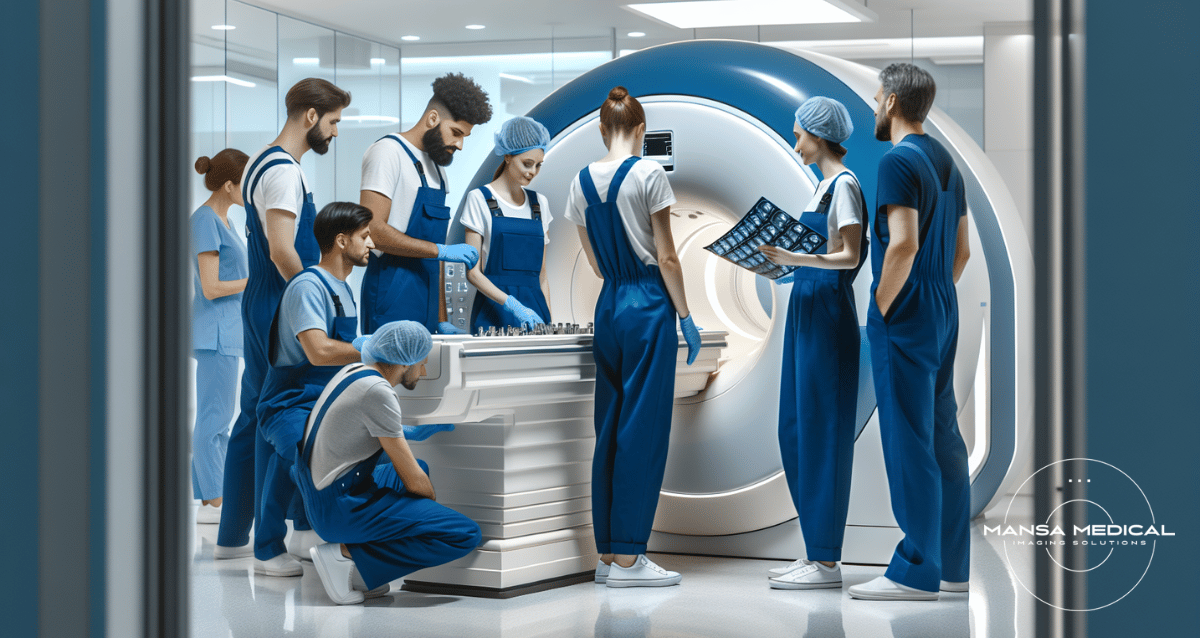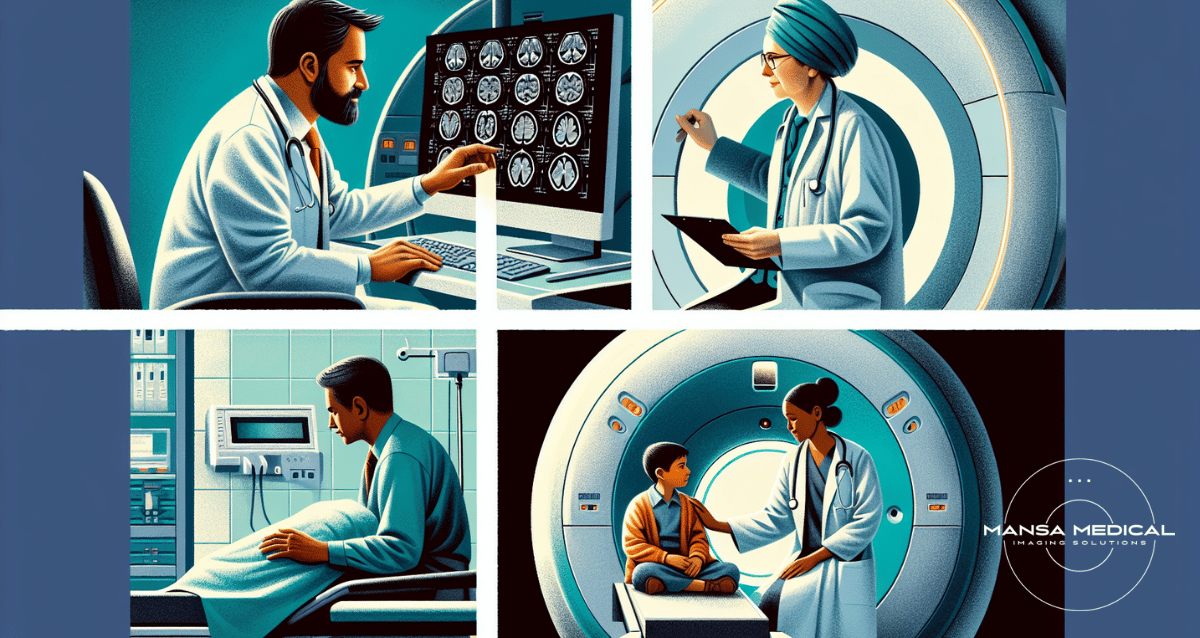Addressing Common Concerns in Purchasing A Used MRI Machine
“Medicine is a science of uncertainty and an art of probability.” – William Osler
Selecting a used MRI machine is a strategic decision that balances cost and performance. Brace yourself because it’s time for you to learn about the considerations of buying used or refurbished MRI equipment, helping you find a reliable solution that aligns with your medical and financial needs without overwhelming you with details or sales pitches.
Key Takeaways
-
Used and refurbished MRI machines provide cost-effective alternatives to new models, allowing healthcare providers to access advanced imaging technology within budgetary constraints.
-
Meticulous inspection processes and refurbishment ensure that second-hand MRI equipment meets high standards of quality and safety, often accompanied by warranties and service agreements similar to new equipment.
-
When selecting a used MRI system, considerations include examination types, patient volume, facility space, magnet strengths, gantry aperture size, and gradient coil specifications to ensure alignment with clinical needs.
Exploring Used MRI Machine Options
MRI machines are sophisticated pieces of technology integral to modern healthcare. From scanning the tiniest anatomical structures to producing clear, high-quality images, MRI machines have revolutionized diagnostic medicine. However, these machines come at a hefty price, posing a financial challenge for many healthcare providers. This is where the market for used MRI machines comes into play, offering diverse models and specifications to meet different clinical needs. For those looking to invest in this essential equipment without breaking the bank, exploring MRI machines for sale, particularly used ones, can be a viable option.
Take, for example, the GE 1.5T EXCITE HDxT 16X – a used MRI machine in the market that perfectly blends quality with advanced imaging technology. With such valuable resources at their disposal, healthcare providers can select the right MRI machine that fits their clinical and operational requirements.
Leading Manufacturers
You may be wondering, what are the leading manufacturers of MRW machines? In this realm, a few key players dominate the industry. The most prominent leading manufacturers here include GE, Philips, Siemens, and Hitachi.
These companies provide an extensive variety of options tailored to meet diverse medical requirements.
Take, for example, the Philips Intera Achieva 1.5T MRI machine. It embodies Philips’ commitment to cutting-edge imaging technology and consistent quality performance.
Mobile MRI Machines
Mobile MRI machines have emerged as a game-changer for healthcare facilities dealing with limited space, budget constraints, or the desire for technology upgrades without full investment. These machines are especially valuable when:
-
Constructing an MRI suite is not feasible
-
Facility upgrades are taking place
-
Meeting immediate scanning needs
-
Waiting to purchase the right in-house system
Mobile MRI machines serve as effective interim solutions in these situations.
Interestingly, mobile MRIs can sometimes provide a broader range of software options, enhancing the variety of imaging services available to patients. However, the patient experience with mobile MRI may require special arrangements for transportation and changing areas, which can be managed to create a seamless process.
Assessing Refurbished MRI Equipment

Acquiring refurbished MRI equipment might seem daunting at first glance, but the thorough refurbishing process renders these devices just as reliable as their freshly manufactured counterparts. Each piece of refurbished MRI machinery is subjected to rigorous examination for signs of wear and potential faults, with any parts found wanting to be replaced by components of superior quality.
The extensive refurbishment protocol includes:
-
Deep cleaning procedures
-
Professional reconditioning efforts
-
Precise diagnostic evaluations and calibrations aiming to achieve high-performance benchmarks necessary for precise imaging results
-
Several cycles of strict quality assurance checks within practical use settings
Such meticulous attention guarantees that the appearance and function of refurbished MRI scanners rival those fresh off the production line in reliability.
Also, when it comes to safety considerations, nothing is left to chance. Comprehensive examinations are conducted on all pieces of refurbished MRI machines so they adhere strictly to prevailing industry standards and regulations regarding safety protocols [1]. Exhaustive records detailing each step in the refurbishment cycle accompany every unit. Thus offering clear insight into what has been undertaken during their renewal process.
Benefits of Choosing Refurbished
A number of compelling benefits come with opting for refurbished MRI systems as opposed to relying on an old system. These include:
-
Significant cost savings
-
Warranties and service agreements similar to new equipment, providing financial protection and peace of mind to buyers
-
Contribution to environmental sustainability by reducing waste and the demand for new materials.
High-quality pre-owned MRI scanner models provide a reliable alternative to new MRI scanners, often including updated technology and components.
Key Considerations When Purchasing a Used MRI System
Although the idea of purchasing a used MRI system can be attractive, it is vital to weigh several factors before finalizing a decision. These include:
-
Types of examinations to be performed
-
Patient volume
-
Budget constraints
-
Maintenance costs
It’s also essential to ensure that your service requirements and facility capabilities align with your patient volume and the average cost per examination.
The availability of refurbished MRI systems can lead to faster procurement times, which is beneficial if the facility needs the equipment promptly [2]. Also, having a clear understanding of your financial position or securing full funding beforehand can expedite the MRI purchasing process and avoid delays.
Magnetic Field Strength
The performance of an MRI machine is heavily influenced by the magnetic field strength, denoted in teslas (T), which determines the magnet’s power. A more robust magnetic field boosts the signal-to-noise ratio, allowing for crisper images with potentially improved clarity. High-field-strength MRIs can enhance spatial resolution—vital for detailed imaging of intricate structures—but they may also introduce a higher chance of artifacts. For many standard clinical procedures, a 1.5T machine offers sufficient detail without necessitating greater field strengths [3].
Gantry Aperture Diameter
When acquiring a used MRI system, it’s important to pay attention to the gantry aperture diameter. Systems with varying sizes of gantry apertures are better equipped to handle patients of diverse body types, adding versatility to your equipment’s capabilities. MRI systems that feature larger gantries not only improve handling for biopsy procedures but also help alleviate feelings of claustrophobia in patients.
Choosing an MRI system with a relatively large gantry aperture—specifically within the range of 70 to 85 cm—is especially beneficial when dealing with bigger patients or performing biopsies. This specification ensures greater adaptability and patient comfort during scanning processes.
Gradient Strength and Slew Rate
Gradient strength and slew rate are crucial specifications of the gradient coils in an MRI, determining the quality and resolution of the final image. The key specifications are:
-
Gradient strength: measured in millitesla per meter (mT/m)
-
Slew rate: defined as the maximum gradient strength divided by the rise time, measuring how quickly gradients can be switched on and off
-
Rise time: measured in milliseconds
These specifications are important factors to consider when evaluating the performance of an MRI system.
The achievable slew rate of an MRI system is influenced by gradient coils and their associated gradient amplifiers. Higher slew rates shorten the minimum possible repetition time (TR) and echo time (TE), crucial for optimizing echo planar imaging (EPI) sequences. Quicker image acquisition, as a result of faster scan rates, contributes to shorter scan times and increased patient throughput.
Gradient strength and slew rate are particularly significant for neuro and cardiac applications, requiring higher strength for superior image clarity, which affects both the capability and cost of MRI systems.
Comprehensive Services for Used MRI Equipment

Purchasing a pre-owned MRI system like those you can find at Mansa Medical involves more than acquiring the equipment. It encompasses the full range of services that come with it. Trustworthy suppliers deliver extensive installation services for MRI systems, which may include complete turnkey solutions and are backed by years of expertise in partnering with medical institutions.
Once refurbished, ongoing support and maintenance are offered to maintain optimal functionality of the MRI machines, highlighting the necessity for prompt and effective repair assistance because of MRIs’ vital function in delivering patient care.
Customized Solutions
Vendors don’t just deliver extensive services. They also tailor solutions to client needs. For example, Tri-Imaging Solutions has developed a part search tool that enables customers to find the exact MRI parts required accurately by implementing scheduled maintenance schemes for every OEM MRI model, which includes routine cleaning, inspections, and swapping out parts when needed.
With this hands-on support, they furnish their clients with expert knowledge of the industry and products. This is crucial in helping clients make educated choices about the appropriate MRI equipment for their specific requirements.
Factors Affecting MRI Machine Cost
Grasping the many factors that influence the cost of MRI machines is vital for effective budgeting and financial planning. Different manufacturers have different cost structures. For instance, GE MRI systems have higher upfront costs but are known for lower ongoing service costs and high parts availability. Philips MRI scanners typically have lower upfront costs in the secondary market but incur higher ongoing service costs due to powerful gradients and higher cryogen consumption.
Siemens MRI scanners are priced comparable to Philips upfront, with ongoing service costs more similar to GE Signa, offering advanced features like zero boil-off magnets. On the other hand, Toshiba MRI systems may come with higher service costs but offer a lower initial purchase price and features like wide-bore design and near-silent scanning technology.
The machine’s year of manufacture, magnetic field strength, gradient strength, slew rate, and number of channels all play significant roles in determining the MRI machine’s price. Additional costs to consider when purchasing an MRI system include installation, warranties, training for staff, the need for helium in cooled systems, and spare parts.
Budgeting Tips
A few tips can aid in streamlining the process when budgeting for MRI equipment. Refurbished MRI machines offer significant cost savings and make advanced imaging technology more accessible to smaller clinics and practices. Identifying the specific imaging needs of a practice can lead to cost-effectiveness by avoiding unnecessary features that inflate the price.
Purchasing and installation of MRI systems requires a realistic timeframe, accounting for room preparations, funding, and setting up the equipment, which can span from several weeks to months. Due to the rapid sale of MRI systems in the market, it’s crucial for healthcare facilities to act quickly once they find an appropriate system from a reliable company that fits their needs and timeframe.
Clinical Applications of MRI Technology

MRI scanners are more than just technological marvels; they are workhorses in the clinical arena. MRI scanners use a strong magnetic field, radio waves, and a computer to produce detailed images of internal structures and organs, offering detailed imaging without ionizing radiation. In oncology, for example, MRI is used for:
-
Diagnosis
-
Staging
-
Response evaluation
-
Follow-up of cancer patients
This positively affects their quality of life and survival rates.
Moreover, magnetic resonance imaging (MRI) is particularly effective in identifying abnormalities within the central nervous system, superior to CT imaging. Whole-body MRI allows rapid, noninvasive imaging of the entire body without ionizing radiation, making it ideal for detecting metastases and assessing multiple myeloma. MRI’s lack of ionizing radiation and sensitivity to myelination patterns makes it an advantageous diagnostic tool for neonatal and pediatric imaging.
Preparing Your Facility for a Used MRI Machine
Upon deciding to acquire a used MRI machine, the next step is to get your facility ready for its arrival. Consult with the equipment provider or directly with us at Mansa Medical to obtain site-specific drawings for the MRI suite, including the scan room, control room, and computer equipment room, and plan secondary areas as required. Architects and engineers should consider pre-construction requirements like the delivery path of the magnet, floor loading, leveling, ceiling height, cryogen access, chiller area, and HVAC systems for proper installation.
Implementing comprehensive MRI safety measures is also crucial. This includes:
-
Installing ferromagnetic detection systems
-
MRI safety signs, stickers, books, training videos, fire extinguishers, and caution stickers to label MRI-compatible equipment for a secure MRI environment
-
Provision of MRI-safe maintenance equipment such as ladders, janitorial supplies, and tools to care for and prolong the life of MRI machines.
Mansa Medical: Illuminating Excellence in MRI and CT Scan Solutions with Unmatched Quality, Safety, and Innovation
In the universe of MRI machine providers, Mansa Medical shines brightly. Mansa Medical is the industry’s top provider of MRI and CT scan turn-key solutions. Specializing in multi-facility upgrades, quick, efficient, hassle-free machine installations, service, and project management, we believe in getting the job done right the first time through an emphasis on quality, accountability, and clear, dependable communication.
Our medical imaging products impact lives, and respectful of this, we are committed to providing equipment that is:
-
clean
-
safe
-
reliable
-
showcases current cutting-edge technology
Looking for temporary solutions? Check out our Mobile CT Rentals, and contact us for more information!
Full Summary
Having traversed the complex landscape of used MRI machines, we’ve seen how these machines offer a cost-effective alternative without compromising on quality or functionality. From exploring diverse options, assessing refurbished equipment, considering key factors, and understanding clinical applications to prepare your facility, purchasing a used MRI machine is a nuanced process. However, with knowledge and careful planning, you can ensure a wise investment that meets your clinical needs and fits within budget constraints. So, are you ready to make a smart move with a used MRI machine?
Frequently Asked Questions
What is the lifespan of an MRI machine?
The longevity of an MRI machine can exceed a decade when it receives consistent maintenance. These machines, often within the 10-year age bracket, are frequently found in use through secondary equipment markets and by independent organizations that provide service for them.
Concerns regarding the durability of an MRI scanner are unwarranted. Its service life is typically quite robust.
Why is running an MRI so expensive?
Operating an MRI incurs high costs for hospitals as they must also finance the operation of emergency departments and provide treatments in various other specializations, such as cardiology and neurology, contributing to overall expenses.
What is a cheap alternative to an MRI?
A CT scan presents a more economical option for imaging than an MRI, typically costing around $1,200—nearly half as much. It requires significantly less time to perform compared to an MRI.
How much does an MRI scan cost to buy?
The price of an MRI scan can vary significantly, ranging from a couple of hundred dollars to multiple thousands. This variance is dependent on both the specific type of MRI needed and where the scan will take place.
When contemplating acquiring an MRI scan, it’s important to be aware of this broad spectrum of potential costs.
What are the advantages of purchasing a used MRI machine?
Acquiring a used MRI machine offers considerable cost advantages, making sophisticated imaging technology more accessible for smaller practices and clinics. Such machines frequently include modernized technology and parts, providing a reliable option comparable to new MRI models.
